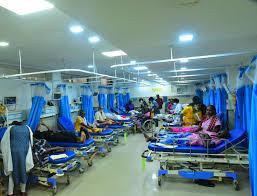Critical Care Medical Center: Ensuring Life-Saving Support When It Matters Most

Healthcare systems are built to handle routine treatments as well as complex conditions. But in cases of severe illnesses, trauma, or life-threatening emergencies, specialized attention is required. This is where a critical care medical center plays a vital role. These centers are designed to provide advanced, round-the-clock care for patients who are critically ill or unstable, offering them the best chance at survival and recovery.
This article explores the concept of critical care, the facilities and expertise available at medical centers, and why they are an indispensable part of modern healthcare.
What is Critical Care?
Critical care, also known as intensive care, is specialized medical treatment provided to patients with severe or life-threatening illnesses or injuries. It typically takes place in Intensive Care Units (ICUs) or Critical Care Units (CCUs), where advanced monitoring and life-support systems are available.
Patients in need of critical care may include those with:
-
Severe infections such as sepsis.
-
Acute respiratory distress or organ failure.
-
Complications after major surgery.
-
Serious injuries from accidents or trauma.
-
Stroke, heart attack, or cardiac arrest.
-
Neurological emergencies such as brain hemorrhage.
What is a Critical Care Medical Center?
A critical care medical center is a specialized hospital or department within a hospital that focuses exclusively on the treatment of critically ill patients. Unlike general hospital wards, these centers have:
-
Advanced life-support systems.
-
Continuous patient monitoring equipment.
-
Highly trained intensivists, critical care nurses, and respiratory therapists.
-
Specialized units for cardiac, neonatal, and surgical intensive care.
The primary goal is to stabilize patients, prevent complications, and support organ functions until recovery is possible.
Facilities in a Critical Care Medical Center
Critical care medical centers are equipped with advanced infrastructure and specialized departments that ensure the highest level of care. Common facilities include:
-
Intensive Care Units (ICUs): For patients with multi-organ failure, severe infections, or after complex surgeries.
-
Cardiac Care Units (CCUs): For patients with heart attacks, arrhythmias, or post-bypass care.
-
Neonatal Intensive Care Units (NICUs): For premature or critically ill newborns.
-
Respiratory Support Systems: Including ventilators, oxygen therapy, and advanced monitoring.
-
24x7 Emergency Department: For rapid stabilization and transfer to critical care.
-
Specialized Operation Theatres: For emergency surgeries and life-saving interventions.
-
Diagnostic and Imaging Services: MRI, CT scans, blood tests, and advanced labs available at all times.
The Role of Medical Professionals in Critical Care
A critical care medical center relies on a team of experts trained to handle emergencies and complex cases:
-
Intensivists: Doctors specialized in critical care medicine who lead patient management.
-
Critical Care Nurses: Provide continuous monitoring and assist in life-support interventions.
-
Respiratory Therapists: Manage ventilators and respiratory treatments.
-
Surgeons and Specialists: Available for trauma, neurology, cardiology, and other emergencies.
-
Counselors and Support Staff: Offer emotional support to patients and families.
This multidisciplinary approach ensures that patients receive comprehensive care.
Importance of Critical Care Medical Centers
The presence of a critical care medical center in a healthcare system is crucial for several reasons:
-
Life-Saving Interventions – Quick access to ventilators, defibrillators, and emergency surgeries can make the difference between life and death.
-
24x7 Monitoring – Critically ill patients require constant observation to detect sudden changes in condition.
-
Specialized Treatment Plans – Tailored interventions for each patient depending on their illness.
-
Post-Surgery Recovery – Patients undergoing complex surgeries often need ICU monitoring.
-
Support for Families – Guidance and updates help families cope with stressful situations.
Challenges in Critical Care
Despite advanced infrastructure, critical care faces unique challenges:
-
Shortage of trained critical care specialists.
-
High treatment costs due to advanced equipment and continuous monitoring.
-
Emotional and mental stress on patients and families.
-
Risk of infections in ICU environments.
Hospitals continuously work on improving hygiene standards, expanding facilities, and training staff to overcome these challenges.
Technological Advancements in Critical Care
Modern critical care medical centers integrate advanced technologies to enhance outcomes:
-
Robotic surgery for precision in complex cases.
-
Artificial intelligence (AI) for predicting patient deterioration.
-
Tele-ICU services allowing remote monitoring by specialists.
-
Electronic Health Records (EHRs) for better continuity of care.
-
Wearable monitoring devices to track patient vitals in real-time.
Technology ensures timely interventions and reduces human error.
Patient-Centered Approach in Critical Care
Critical care is not just about machines and medications — it is also about compassion. Hospitals today focus on:
-
Respecting patient dignity, even in critical situations.
-
Providing psychological support to patients who may be conscious in ICUs.
-
Involving families in discussions about treatment plans.
-
Offering counseling for long-term recovery and rehabilitation.
Critical Care for Different Age Groups
Critical care services are tailored to different patient categories:
-
Adults: Heart attacks, strokes, trauma, respiratory issues.
-
Children: Pediatric intensive care for severe infections, congenital conditions, or surgeries.
-
Newborns: NICUs support premature babies and those with birth complications.
-
Elderly: Age-related complications like organ failure, dementia, or chronic illness management.
How to Identify a Reliable Critical Care Medical Center
If you or a loved one needs urgent healthcare, choosing the right center can save lives. Look for:
-
Accreditation (such as NABH certification).
-
Availability of 24x7 emergency services.
-
Well-equipped ICUs and CCUs.
-
Experienced specialists and nurses.
-
Transparent communication with families.
The Future of Critical Care
Critical care is expected to evolve rapidly in the coming years. Trends include:
-
Personalized medicine for critically ill patients.
-
AI-driven monitoring and predictive analytics.
-
Expansion of tele-ICUs to smaller cities.
-
Focus on affordable care through insurance and government initiatives.
These advancements will improve access and outcomes for patients in need of critical interventions.
Conclusion
A critical care medical center is the backbone of modern healthcare, providing life-saving interventions when time and expertise matter most. With specialized ICUs, trained professionals, and advanced technology, these centers ensure that critically ill patients receive the best possible chance of recovery.
Beyond medical treatment, they also provide emotional support, guidance, and reassurance to families during difficult times. As healthcare continues to advance, critical care centers will remain essential pillars of hope and healing, ensuring that every patient receives care when it is needed most.






